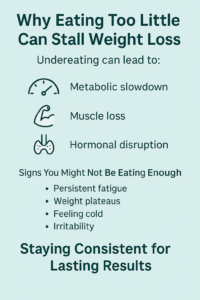Eating Too Little Could Be Stalling Your Weight Loss Journey
For many people on a weight loss journey—sometimes even for those taking GLP-1 medications—there’s a surprising pattern we see: the scale stops moving. You’ve been eating less, exercising more, taking your prescription exactly as directed… yet progress slows or stops altogether. At Flow Wellness, we work with patients who’ve spent months—or even years—committed to their health. They’ve tracked meals, stuck with workouts, and followed their treatment plans. Many patients even start strong on GLP-1s, losing a few pounds each month, only to hit a stubborn plateau later. When you have an experienced and attentive clinician like those here at Flow Wellness, we help you identify if undereating could be the culprit.
How Undereating Works Against You
Your body is wired for survival. When calorie intake drops too low, it doesn’t speed up fat loss—it slows things down. This shift into energy conservation mode (often called “starvation mode”) can sabotage your progress.
Research shows that eating well below your needs can cause:
-
Metabolic slowdown – Studies in The American Journal of Clinical Nutrition found that severe calorie cuts lower your resting metabolic rate, meaning you burn fewer calories even when not exercising.
-
Muscle loss – Without enough nutrients, your body may break down lean muscle for fuel, weakening your metabolism over time.
-
Hormonal disruption – Drops in leptin (the fullness hormone) and thyroid hormones can slow fat loss and make hunger signals stronger.
Signs You Might Be Eating Too Little
In our medical weight loss programs, we often see these red flags in patients who aren’t eating enough:
-
Persistent fatigue despite adequate rest
-
Weight plateaus lasting four weeks or more
-
Feeling colder than usual
-
Decreased strength or workout performance
-
Irritability or trouble focusing

The Research That Proves It
A 2016 NIH study on The Biggest Loser contestants found that participants’ metabolisms slowed dramatically—and stayed that way for years. Many had been eating far too little for their activity level, making it harder to keep weight off long-term.
The takeaway: when your body thinks food is scarce, it works to conserve energy and hold onto fat stores.
How Flow Wellness Supports You
Our goal is to keep your metabolism working for you, not against you. Whether you visit our clinics in Bend, Oregon or Seattle, or connect virtually from Washington, Oregon, or California, your care plan is customized to your needs. You’ll have direct access to your provider, regular check-ins, and continuous support to keep your weight loss healthy and sustainable.
When you’re on GLP-1 medication, appetite naturally decreases. While that can help prevent overeating, it can also lead to accidentally eating too little—especially protein. That’s why we give all our GLP-1 patients (whether microdosing for health benefits or taking standard doses for weight loss) three core nutrition guidelines:
-
Hydration – At least one liter of water daily.
-
Protein – Aim for about 100 grams per day to maintain muscle.
-
Calories – At least 1,500 nutrient-dense calories per day, more if you’re active.
Nutrient-dense means whole foods: vegetables, fruits, lean proteins, healthy fats, and complex carbs.
If tracking your intake feels new or overwhelming, here are some free tools to help you keep track of your food:
-
FatSecret – Easy logging with barcode scanning
-
Cronometer – Detailed and accurate nutrition tracking
-
Lose It! – Goal-based calorie and macro tracking
-
MyFitnessPal – Large food database with built-in BMR calculator
The Key to Long-Term Success
GLP-1 medication can be life-changing for weight loss, but it works best alongside proper nutrition, adequate calories, and consistent support. Avoiding undereating is just as important as avoiding overeating. By fueling your body well, you’ll keep your metabolism strong, protect muscle mass, and maintain steady progress toward your goals.
Check out these other helpful blogs:
- Doctor Q&A: Common Questions About GLP-1 Medications Answered
- The Best Weight Loss Clinic in the Pacific Northwest
- When One Person Starts Losing Weight with GLP1s – Everyone Benefits




